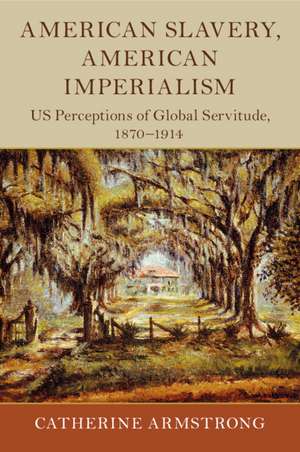American Slavery, American Imperialism: US Perceptions of Global Servitude, 1870–1914: Slaveries since Emancipation
Autor Catherine Armstrongen Limba Engleză Paperback – 21 iun 2023
| Toate formatele și edițiile | Preț | Express |
|---|---|---|
| Paperback (1) | 177.91 lei 3-5 săpt. | +16.91 lei 6-10 zile |
| Cambridge University Press – 21 iun 2023 | 177.91 lei 3-5 săpt. | +16.91 lei 6-10 zile |
| Hardback (1) | 419.85 lei 6-8 săpt. | |
| Cambridge University Press – 29 iul 2020 | 419.85 lei 6-8 săpt. |
Din seria Slaveries since Emancipation
-
 Preț: 225.20 lei
Preț: 225.20 lei -
 Preț: 236.86 lei
Preț: 236.86 lei -
 Preț: 222.65 lei
Preț: 222.65 lei -
 Preț: 179.26 lei
Preț: 179.26 lei -
 Preț: 212.07 lei
Preț: 212.07 lei - 11%
 Preț: 583.36 lei
Preț: 583.36 lei -
 Preț: 374.36 lei
Preț: 374.36 lei
Preț: 177.91 lei
Nou
Puncte Express: 267
Preț estimativ în valută:
34.05€ • 36.97$ • 28.60£
34.05€ • 36.97$ • 28.60£
Carte disponibilă
Livrare economică 02-16 aprilie
Livrare express 18-22 martie pentru 26.90 lei
Preluare comenzi: 021 569.72.76
Specificații
ISBN-13: 9781108701914
ISBN-10: 1108701914
Pagini: 297
Dimensiuni: 229 x 152 x 22 mm
Greutate: 0.44 kg
Editura: Cambridge University Press
Colecția Cambridge University Press
Seria Slaveries since Emancipation
Locul publicării:New York, United States
ISBN-10: 1108701914
Pagini: 297
Dimensiuni: 229 x 152 x 22 mm
Greutate: 0.44 kg
Editura: Cambridge University Press
Colecția Cambridge University Press
Seria Slaveries since Emancipation
Locul publicării:New York, United States
Cuprins
List of figures; Acknowledgements; Introduction; 1. A rhetorical continuum? How representations of antebellum slavery endure in post-war culture; 2. Global contexts: how external factors drive US perceptions of slavery; 3. Othering the slave owner; 4. Othering the enslaved; 5. Gender and the rhetoric of slavery; 6. Resistance and the slavery counter-narrative; Conclusion; Bibliography; Index.
Recenzii
'This important and original interdisciplinary book sheds new light on how the US used slavery to mould its own post-war identity through the rhetorical tool of 'othering'. Wide-ranging in its theoretical and methodological scope and geographic context, Armstrong successfully draws upon diverse forms of popular culture to decipher how the nation sought to identify itself as an antislavery imperialist power between the ending of the Civil War and the onset of World War I.' Emily West, Professor of American History, University of Reading
'In this elegant and deeply-researched book, Catherine Armstrong discusses how Americans came to terms with unfree forms of labour in an era when slavery had been abolished. Overlooking the domestic persistence of unfree labour, many Americans linked the continuation of slavery around the world to non-white 'others' that in turn helped to justify the need for white imperialism. This book has powerful resonances for the analysis of modern-day slavery.' Tim Lockley, University of Warwick
'Drawing astutely on recent scholarship, Armstrong illumines how, from Reconstruction to WWI, Americans manipulated their depictions of slavery, including its perpetrators and victims, to reinforce either a conservative or progressive racial, imperial, or gendered agenda … Recommended.' J. D. Smith, Choice
'In this elegant and deeply-researched book, Catherine Armstrong discusses how Americans came to terms with unfree forms of labour in an era when slavery had been abolished. Overlooking the domestic persistence of unfree labour, many Americans linked the continuation of slavery around the world to non-white 'others' that in turn helped to justify the need for white imperialism. This book has powerful resonances for the analysis of modern-day slavery.' Tim Lockley, University of Warwick
'Drawing astutely on recent scholarship, Armstrong illumines how, from Reconstruction to WWI, Americans manipulated their depictions of slavery, including its perpetrators and victims, to reinforce either a conservative or progressive racial, imperial, or gendered agenda … Recommended.' J. D. Smith, Choice
Notă biografică
Descriere
Details how Americans' perceptions of the institution of slavery changed between the end of the Civil War and the onset of World War I.
